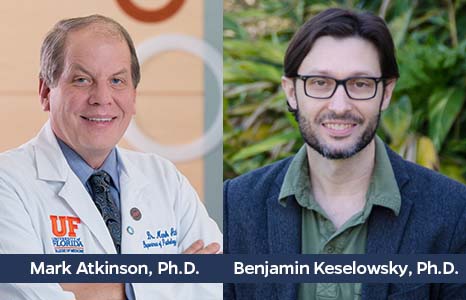Dr. Benjamin Keselowsky, UF BME professor and Dr. Mark Atkinson, UF professor, Departments of Pathology and Pediatrics, were awarded a new five-year T32 grant from the National Institute of Health (NIH) entitled, “Interdisciplinary Graduate Program in Type 1 Diabetes and Biomedical Engineering.”
Drs. Keselowsky and Atkinson are co-program directors working with Dr. Cherie Stabler and Dr. Clayton Mathews as associate co-directors.
Drs. Gregory Hudalla, Lin Yang and Edward Phelps will serve as training faculty on the biomedical engineering side to select BME students for enrollment into the T32 training program, which includes formal coursework, skill development workshops, seminars and journal clubs.
The training program designed for co-mentoring of pre-doctoral students in an environment and culture providing strong interdisciplinary support for bioengineering and type 1 diabetes (T1D), will result in a new generation of researchers poised to contribute to a fuller understanding of, and new technologies for disease management, prevention and reversal.
Recent advances, largely technology-based, have led to dramatic improvements in disease management for those living with T1D. However, despite an obvious need, the number of individuals cross-trained in the disciplines of biomedical engineering and T1D is extremely limited. This effort is designed to develop pre-doctoral students into graduates having skill sets and knowledge vital for endeavors that bridge these two disciplines.
With nearly 30 million Americans afflicted, the majority of such attention has been directed at type 2 diabetes (T2D), given the predominance of such cases. However, T1D, the autoimmune form of the disease, is also rising at unexplainable rates and carries with it higher levels of long-term morbidity and mortality. Despite years of attempts to identify methods to prevent and/or cure T1D, no such therapy currently exists.
This, in turn, forms the need to train a generation of future scientists in fundamental biomedical sciences, engineering principles, and clinical practice to effectively link their research to address the prevention, reversal and treatment of T1D.
The grant consists of four student slots each year for five years, half of which is allotted for the training of students in the area of diabetes and biomedical engineering.
BME students will be paired with a BME faculty mentor and a diabetes faculty mentor, and assistant-level faculty (preceptors in training) will be paired with a senior faculty mentor.
